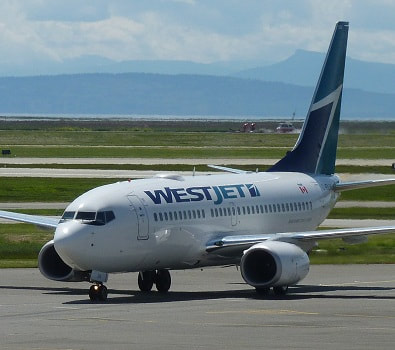New open skies talks take flight
November 7, 2005
OTTAWA -- Canada and the United States will begin talks today that could lead to a freer-trade deal in the North American airline industry as soon as this week, an agreement that would likely mean healthier profits for airlines on both sides of the border and lower prices for passengers. The two countries, which agreed earlier this year to work toward a new "open skies" agreement, hope to work out a deal that would allow airlines from both countries more flexibility to compete for passengers and cargo on the other side of the border. A deal would mark the first major step toward a more continental approach to the airline industry -- and more liberal trade rules -- since 1995. "We're on the same page," said Irene Marcheterre, a spokeswoman for Transport Minister Jean Lapierre. The two countries, along with airlines, unions, and other stakeholders, will kick off the talks in Washington today with discussion about key peripheral issues around "open skies." Those issues include ensuring pre-clearance and airline access to each country's busiest airports Negotiations on the actual open skies deal will begin tomorrow and are expected to be completed before Friday. If a deal is reached, the two ministers -- Mr. Lapierre and his U.S. counterpart, Secretary of Transportation Norman Mineta -- would likely make it official with a signing ceremony within a month or two. Brigita Gravitis-Beck, Transport Canada's director-general of air policy and the department's top negotiator in the talks with the U.S., said both countries believe a liberalized North American airline industry would fuel greater competition and major benefits. "There will be better pricing choices." Government sources say the biggest change would be that a Canadian airline taking passengers or cargo to a U.S. city would be able to pick up more business in that U.S. city, and then fly the people or goods to a third country. The reverse would of course also be true for a U.S. airline that wanted to do more business in Canada. As things stand now, Canadian airlines can fly passengers and cargo to the U.S. but can't then pick up more business there for third-country destinations. Despite the widespread lauding of the open skies talks, the practice of allowing Canadian airlines to transport passengers or cargo from one U.S. city to another -- a practice known as "cabotage" -- is not on the table. U.S. carriers would similarly not be allowed to exercise cabotage in Canada. "A lot of people worry about this," said Ms. Gravitis-Beck. "It's not on." Fred Gaspar, spokesman for the Air Transport Association of Canada, said the new framework could come at an opportune time for Canadian airlines, which have long wanted greater access to the lucrative U.S. market. Air Canada, the country's largest airline, reported last week that it overcame higher fuel prices to post a $270-million profit in its third quarter, a notable comeback for a company that emerged from bankruptcy protection just last year. Canada's flagship carrier is now in a strong financial position in comparison with many of its U.S. rivals in a sector marred in recent years by high fuel prices, low ticket prices, and plenty of red ink. WestJet Airlines Ltd., meanwhile, is eyeing an expansion into overseas markets. Laura Cooke, a spokeswoman for Air Canada, said a new open skies deal is needed to bring North America in line with many other parts of the world. The U.S. has already signed various forms of open skies deals with more than 60 countries in recent years. During a visit to Ottawa in February, Mr. Mineta said a deal to expand free trade for airlines would "achieve the vision of NAFTA in the skies." He also said Canada and the U.S. could form a "North American bloc for aviation" that could negotiate open skies deals with other blocs, such as Europe and Asia. Roger Gallaway, a Liberal MP and chair of the House of Commons transport committee, said the open skies talks make it even more important that Canada go further in cutting the rent that airports must pay Ottawa. Those rental payments, which are ultimately passed on to airlines and then passengers, are much higher in Canada than in the U.S. Mr. Gallaway said the gap will give U.S. airlines and airports a big edge over their Canadian rivals, particularly Toronto's Pearson International Airport. When Ottawa cut airport rents earlier this year, Pearson saw its rent cut by $5-billion -- or 62.5 per cent -- over the life of its lease, but received no immediate help. "Pearson will be flat-lined on this," Mr. Gallaway said. FlyForLess is not affiliated with any media companies nor does it represent or work for WestJet. This article is published with the sole purpose of making information available for those who wish to stay informed on WestJet's actualities. |
|

|
|
Discount Airline Tickets | Flights | Airports | Privacy Policy | About Us | Contact Us
FlyForLess.ca is an affiliate of Aviasales/JetRadar, a leading flight search engine that allows users
to compare airfares from over 700 airlines and travel agencies in order to find the cheapest flight tickets.
We offer discount airline tickets with a database of over 2 million international airfares, as well as car rentals, hotels, and vacation packages
with departures from cities across Canada. Book your cheap flights, discount car rentals, and special hotel rates with FlyForLess.ca
©2023 FlyForLess.ca. All rights reserved
FlyForLess.ca is an affiliate of Aviasales/JetRadar, a leading flight search engine that allows users
to compare airfares from over 700 airlines and travel agencies in order to find the cheapest flight tickets.
We offer discount airline tickets with a database of over 2 million international airfares, as well as car rentals, hotels, and vacation packages
with departures from cities across Canada. Book your cheap flights, discount car rentals, and special hotel rates with FlyForLess.ca
©2023 FlyForLess.ca. All rights reserved
